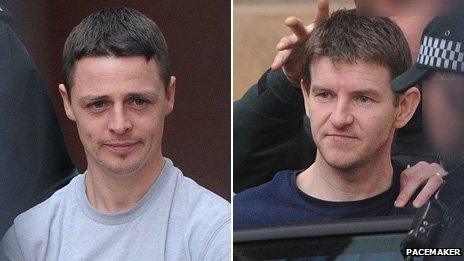Londonderry mortars: Two men remanded in custody
- Published

Two men from Londonderry have appeared in court charged in connection with the discovery of four mortar bombs and a pipe bomb in the city.
They were arrested when police stopped a van in the Brandywell area on Sunday.
Gary McDaid, of Glenowen Park and Seamus McLaughlin, of Eastway Gardens in Creggan, were both refused bail.
They are charged with having explosives with intent to endanger life, conspiracy to cause an explosion, and having a van for terrorist purposes.
Refusing bail, the judge said the men posed a serious risk to society.
Target
The bombs were found in the van and the roof of the vehicle had been cut back to allow the mortars to be fired.
The police said that the likely target was a police barracks in Derry.
Mr McDaid, 37, and Mr McLaughlin, 35, waved to their supporters as they were brought into the dock at Londonderry magistrates court on Wednesday morning.
A detective constable told the court she believed she could connect the defendants with the charges, and she then outlined the circumstances of the case.
She said that at 20:15 GMT on Sunday 3 March, police stopped a white Citroen Berlingo van and a Honda motorcycle on the Letterkenny Road in Londonderry, at its junction with Lone Moor Road.
She said the driver of the van was Seamus McLaughlin and the driver of the motorcycle was Gary McDaid.
Incendiary device
Both men were arrested under the Terrorism Act. A third man was arrested later but has since been released unconditionally.
She said police searched the van and found four mortars located in launch tubes, secured in a frame and ready for imminent deployment.
The weapons contained substantial quantities of explosives.
She said officers also found a blast incendiary device in the front passenger foot well of the van, that police suspected was intended to be used to destroy forensic evidence from the van following the deployment of the mortars.
They also found two kitchen timer units, two toggle switches attached to the timers in a plastic lunch-type box and a vehicle battery in the front passenger foot well. The driver's seat was covered in plastic.
Rubber gloves
The detective constable told the court that a large hole had been cut out of the roof of the van and it had been covered in tape.
The investigating officer said Mr McLaughlin was wearing rubber gloves and forensic overshoes, and several layers of clothing, including high visibility trousers underneath his jeans.
When the motorcycle was stopped, Mr McDaid was in possession of two motorcycle helmets and officers suspect he was travelling in convoy with the white van.
The detective constable added that police believed the second helmet was intended for Mr McLaughlin and the the plan was that he would be a pillion passenger on the motorcycle following the intended mortar attack.
Refused to talk
The court heard both suspects were intensively interviewed by police after arrest.
Mr McLaughlin refused to talk throughout the interview process and did not provide any account of his presence in the van or of the mortars.
He could not account for the layers of clothing or the forensic overshoes.
Mr McDaid told police during interview that he had been riding an old motorbike, and was making his way back into Derry when he was stopped. He said he was going to get petrol, but there was no money in his possession.
Mr McDaid provided a partial account of how he obtained the motorbike and his whereabouts, but the court was told that police carried out inquiries regarding his movements and do not accept this to be a truthful account.
Circumstantial evidence
Objecting to bail, the investigating officer said police believed the circumstances clearly indicate the defendants were active and prominent members of dissident republican groups.
Defence solicitors said neither defendant had any relevant record, the police had only circumstantial evidence and there did not appear to be any forensic evidence at this stage.
They said their clients would abide by any conditions set by the court and would appear for trial.
However, Judge Barney McElholm said there was a very strong circumstantial case that both were involved in serious terrorist activity.
Cheered
He said there was very much a risk of flight and the fear that they would commit further offences was a very real one.
Bail was refused and both men were remanded in custody to appear again via video link on 28 March .
Supporters of the accused cheered and clapped as they were driven away from the courthouse by police.
- Published5 March 2013
- Published4 March 2013
- Published4 March 2013
- Published4 March 2013
- Published14 August 2023